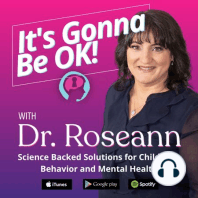4 min listen

09: What Conditions Neurofeedback is Good For
FromScience Backed Solutions for Children’s Behavior and Mental Health
09: What Conditions Neurofeedback is Good For
FromScience Backed Solutions for Children’s Behavior and Mental Health
ratings:
Length:
15 minutes
Released:
Jan 31, 2023
Format:
Podcast episode
Description
Thousands of research studies show how effective neurofeedback is in treating symptoms that are related to everything from attention deficit hyperactivity disorder (ADHD), anxiety, and obsessive-compulsive disorder (OCD) to Pediatric Acute-onset Neuropsychiatric Syndrome (PANS) and Pediatric Autoimmune Neuropsychiatric Disorders Associated with Streptococcal Infections (PANDAS). Neurofeedback is a powerful tool that helps calm and regulate the brain. It is highly recommended that you use this therapy and help your child improve his or her mental health. We have to follow research because when we do, we know that we’ll have solutions. Continue keeping your head up and just know that it’s gonna be okay.Why and how is neurofeedback a powerful and helpful tool?There are many ways to calm and regulate the brain, but neurofeedback is a powerful one, if not the most powerful available treatment out there. One of the best things about neurofeedback therapy is that it is an evidence-based approach with thousands of research studies for over 50 years to show its efficacy. Undoubtedly, it can help with countless problems, including ADHD, learning problems, post-traumatic stress disorder, headaches, immune system problems, processing, and many more.Another good point to raise as to why neurofeedback is such a powerful tool is because it regulates the brain waves. In this process, there is a positive cascade that happens. Many factors affect the functions of neurotransmitters besides medication, and these brain waves are one of those.Neurofeedback, being the powerful tool that it is, directly manipulates these brain waves. With this, we can turn on understimulated areas of the brain and reduce overstimulated areas of the brain. Why are there many research studies about neurofeedback and people with ADHD?Many research studies tackle the topics of neurofeedback in relation to people with the first condition that we’re going to discuss - ADHD. The reason for this is that the changes and the symptoms in people with ADHD are easily observed. We usually see impulse control, behavioral regulation, hyperactivity, and inattentiveness. Those are all observable, so when we see those manifested in our child’s behaviors, we know we have to do something. What happens in the brain of someone with ADHD?For people with ADHD, what happens in their brains is that it becomes understimulated. We’ll see that in a range of inattentive behaviors. We’ll know that there are too many unfocused brain waves and not enough focused ones if we check brain activity through brain mapping.Everybody with ADHD has executive functioning issues, but not everybody with executive functioning issues has ADHD. They can have primary anxiety, primary OCD, primary autism, or others. You can learn more about it in another blog post: https://drroseann.com/what-is-executive-function-disorder-and-how-is-it-different-from-adhd/.What is executive functioning?Attention is the brain's ability to alert, whereas the second condition, Executive Functioning, is the brain's ability to take planned action toward a goal.In relation to self-regulation, executive functioning is important to improve your child’s learning and development. It also enables you to create positive behavioral changes and to make healthy choices for yourself, your children, and your family.What does an anxious brain look like?Anxiety is a nexus for another condition - OCD. In case you’re wondering what an anxious brain would like, it looks like a brain on fire as it is being overstimulated.So there’s a lot of overstimulation,...
Released:
Jan 31, 2023
Format:
Podcast episode
Titles in the series (100)
It's Gonna Be Ok! by Science Backed Solutions for Children’s Behavior and Mental Health